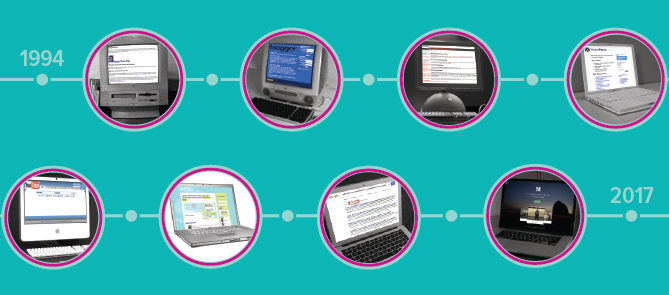A Brief Timeline of the History of Blogging
How Blogging Changed the Web

Access to the World Wide Web has allowed people to access, communicate and disseminate information, eliminating barriers, such as distance and time. The WWW has allowed us to post blogs online for the world to see. These are the connections that form the communities around which people communicate and share ideas.
It all began in the later part of the '90s when people saw an uprising in resources that had been created just for bloggers. One of these resources, Open Diary, launched in 1998 and became one of the most pivotal blogging platforms. This was the first of its kind that allowed members of the community to comment on the work of others. Following Open Diary, in 1999 Blogger, LiveJournal, and Xanga all launched.
People were starting to figure out how to monetize their blogs and the stage was set for businesses and individuals alike to take bloggers seriously. Heather B. Armstrong was a blogger who was fired because she wrote about her colleagues on her personal blog. This sparked a conversation about the privacy and freedom of expression for bloggers everywhere. In the early 2000s, there were first signs of a rise in political blogs. In 2003 several traditional media outlets were encouraging staff writers and columnists to double as "cyberjournalists." This reflected a growing number of political bloggers, with many seasoned reporters looking to blogging for opinion and beat outlets.
After the introduction of short-form, real-time information sharing also became an increase in visceral communication. There were countless of mean tweets and harmful comments left on blogs. It got so bad that a new media mogul, Tim O'Reilly, proposed a Blogger's Code of Conduct in response to threatening comments that a friend of his had received on her blog. The rules were as follows: take responsibility not just for your own words, but for the comments you allow on your blog, label your tolerance level for abusive comments, consider eliminating anonymous comments, ignore the trolls, take the conversation offline, and talk directly, or find an intermediary who can do so, if you know someone who is behaving badly, tell them so, and don't say anything online that you wouldn't say in person.
On a more personal level, I think blogs are a great invention because it allows those who do not have a voice to speak up. They can express their opinions and write what they want on their blogs for everyone to see. I personally loved having a blog as an assignment for class because it allowed me to take the information I found and create my own opinion on it. To future students, I highly recommend that you keep up with your blog because it is a very valuable experience and great practice for the future.
How Blogging Changed the Web

Access to the World Wide Web has allowed people to access, communicate and disseminate information, eliminating barriers, such as distance and time. The WWW has allowed us to post blogs online for the world to see. These are the connections that form the communities around which people communicate and share ideas.
It all began in the later part of the '90s when people saw an uprising in resources that had been created just for bloggers. One of these resources, Open Diary, launched in 1998 and became one of the most pivotal blogging platforms. This was the first of its kind that allowed members of the community to comment on the work of others. Following Open Diary, in 1999 Blogger, LiveJournal, and Xanga all launched.
People were starting to figure out how to monetize their blogs and the stage was set for businesses and individuals alike to take bloggers seriously. Heather B. Armstrong was a blogger who was fired because she wrote about her colleagues on her personal blog. This sparked a conversation about the privacy and freedom of expression for bloggers everywhere. In the early 2000s, there were first signs of a rise in political blogs. In 2003 several traditional media outlets were encouraging staff writers and columnists to double as "cyberjournalists." This reflected a growing number of political bloggers, with many seasoned reporters looking to blogging for opinion and beat outlets.
After the introduction of short-form, real-time information sharing also became an increase in visceral communication. There were countless of mean tweets and harmful comments left on blogs. It got so bad that a new media mogul, Tim O'Reilly, proposed a Blogger's Code of Conduct in response to threatening comments that a friend of his had received on her blog. The rules were as follows: take responsibility not just for your own words, but for the comments you allow on your blog, label your tolerance level for abusive comments, consider eliminating anonymous comments, ignore the trolls, take the conversation offline, and talk directly, or find an intermediary who can do so, if you know someone who is behaving badly, tell them so, and don't say anything online that you wouldn't say in person.
On a more personal level, I think blogs are a great invention because it allows those who do not have a voice to speak up. They can express their opinions and write what they want on their blogs for everyone to see. I personally loved having a blog as an assignment for class because it allowed me to take the information I found and create my own opinion on it. To future students, I highly recommend that you keep up with your blog because it is a very valuable experience and great practice for the future.
Comments
Post a Comment